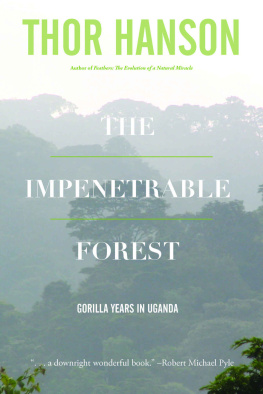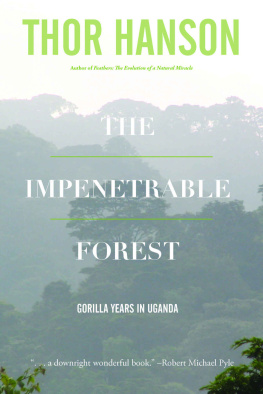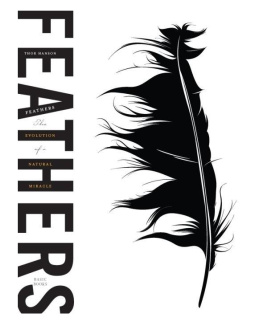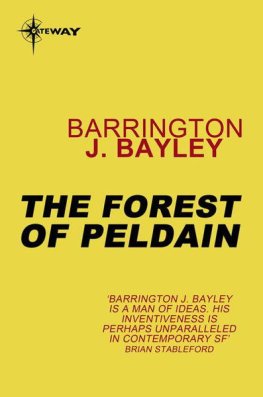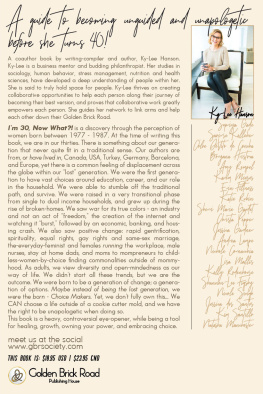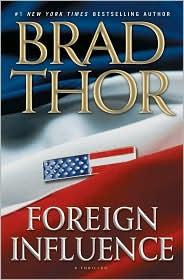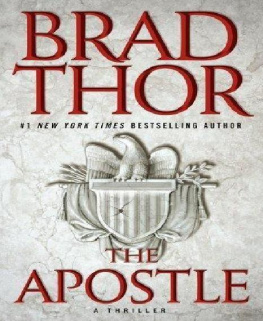Thor Hanson - The Impenetrable Forest
Here you can read online Thor Hanson - The Impenetrable Forest full text of the book (entire story) in english for free. Download pdf and epub, get meaning, cover and reviews about this ebook. year: 2014, publisher: Curtis Brown Unlimited, genre: Home and family. Description of the work, (preface) as well as reviews are available. Best literature library LitArk.com created for fans of good reading and offers a wide selection of genres:
Romance novel
Science fiction
Adventure
Detective
Science
History
Home and family
Prose
Art
Politics
Computer
Non-fiction
Religion
Business
Children
Humor
Choose a favorite category and find really read worthwhile books. Enjoy immersion in the world of imagination, feel the emotions of the characters or learn something new for yourself, make an fascinating discovery.
- Book:The Impenetrable Forest
- Author:
- Publisher:Curtis Brown Unlimited
- Genre:
- Year:2014
- Rating:5 / 5
- Favourites:Add to favourites
- Your mark:
- 100
- 1
- 2
- 3
- 4
- 5
The Impenetrable Forest: summary, description and annotation
We offer to read an annotation, description, summary or preface (depends on what the author of the book "The Impenetrable Forest" wrote himself). If you haven't found the necessary information about the book — write in the comments, we will try to find it.
The Impenetrable Forest — read online for free the complete book (whole text) full work
Below is the text of the book, divided by pages. System saving the place of the last page read, allows you to conveniently read the book "The Impenetrable Forest" online for free, without having to search again every time where you left off. Put a bookmark, and you can go to the page where you finished reading at any time.
Font size:
Interval:
Bookmark:
The Impenetrable
Forest
Gorilla Years in
Uganda
THOR HANSON
Words in local languages are italicized throughout the text and defined in the glossary. The English dialogue often reflects Ugandan vernacular.
Copyright 2001, 2008, 2014 by Thor Hanson.
All rights reserved.
(Insert CB Digital Logo)
Printed in the United States of America
ISBN 13:
ISBN 10:
Grateful acknowledgment is made to the following for permission to print previously published material:
Houghton Mifflin Company: From In the Shadow of Man by Jane Goodall. Copyright 1971 by Hugo and Jane van Lawick-Goodall. Reprinted by permission of Houghton Mifflin Co. All rights reserved. From Gorillas in the Mist by Dian Fossey. Copyright 1983 by Dian Fossey. Reprinted by permission of Houghton Mifflin Co. All rights reserved.
Random House, Inc.: From Congo by Michael Crichton. Copyright 1980 by Michael Crichton. Reprinted by permission of Alfred A. Knopf, a division of Random House. All rights reserved.
HarperCollins: From The Essential Haiku, edited by Robert Hass. Copyright 1994. Reprinted by permission of HarperCollins. All rights reserved.
Lonely Planet Publications: 1997 Guide to East Africa. Copyright 1997 by Lonely Planet. Reprinted by permission of Lonely Planet Publications. All rights reserved.
The University of Chicago Press: From The Mountain Gorilla by George Schaller. Copyright 1963, 1976 by The University of Chicago. Reproduced by permission of The University of Chicago Press.
East African Educational Publishers, Ltd.: From An Elegy by Laban Erapu in Poems from East Africa. Copyright 1971. Reproduced by permission of East African Educational Publishers, Limited.
Pollinger Limited: From No Room in the Ark by Alan Moorehead. Copyright 1959. Reproduced by permission of Pollinger Limited and the Estate of Alan Moorehead.
For my parents
the fisherman who taught me to persevere
and the artist who gave me words
Praise for The Impentrable Forest
"Thor Hanson's memoir is a fascinating and enjoyable read. Particularly timely, it gives us great insight into conservation and ecotourism in a world that is often harsh and cruel. More so, though, Impenetrable Forest transforms the mountain gorillas of Uganda and the people who care for them into deep, complex, loving characters. "
Garth Stein, NYT Bestselling author of The Art of Racing in the Rain
"...a downright wonderful book. A fine writer and a superb naturalist, he brings the true observer's eye and the artist's sensibility to one of the most compelling subjects in all natural history....an unforgettable bookfunny, tragic and brilliant."
Robert Michael Pyle, author of Sky Time in Gray's River
"Thor Hansons Impenetrable Forest is a fascinating account of African reality that explores vital issues for the survival of mountain gorillas. It is an engaging personal story of change and challenge, an articulate natural and cultural history, and a clear call to conscience to preserve habitat and species."
Phil Condon, author of Montana Surround & Clay Center
Praise for Feathers: The Evolution of a Natural Miracle
A fascinating book about the most remarkableand beautifulof all avian evolutionary adaptations, with wonderful accounts of ornithological investigations and the solving of biological quandaries and questions, all of it unusually well-written. Highly recommended.
Peter Matthiessen, National Book Award-winning author of The Snow Leopard
A winning book about the extraordinary place of feathers in animal and human historyThe unifying element in his writing is a contagious curiosity about the explainable world. Feathers is an earthbound book, but this does not keep the authoror the readerfrom looking up in wonder.
Wall Street Journal
Thor Hansons new book takes on the intriguing subject of feathers. With infectious enthusiasm, he describes them, from their earliest known incarnations to their place in the modern world. Hansons unpretentious style makes what is essentially an excellent scientific work into an enjoyable read for the ignorant and uninitiated.an illuminating study of an evolutionary marvel.
The Economist
Also by Thor Hanson:
Feathers: The Evolution of a Natural Miracle
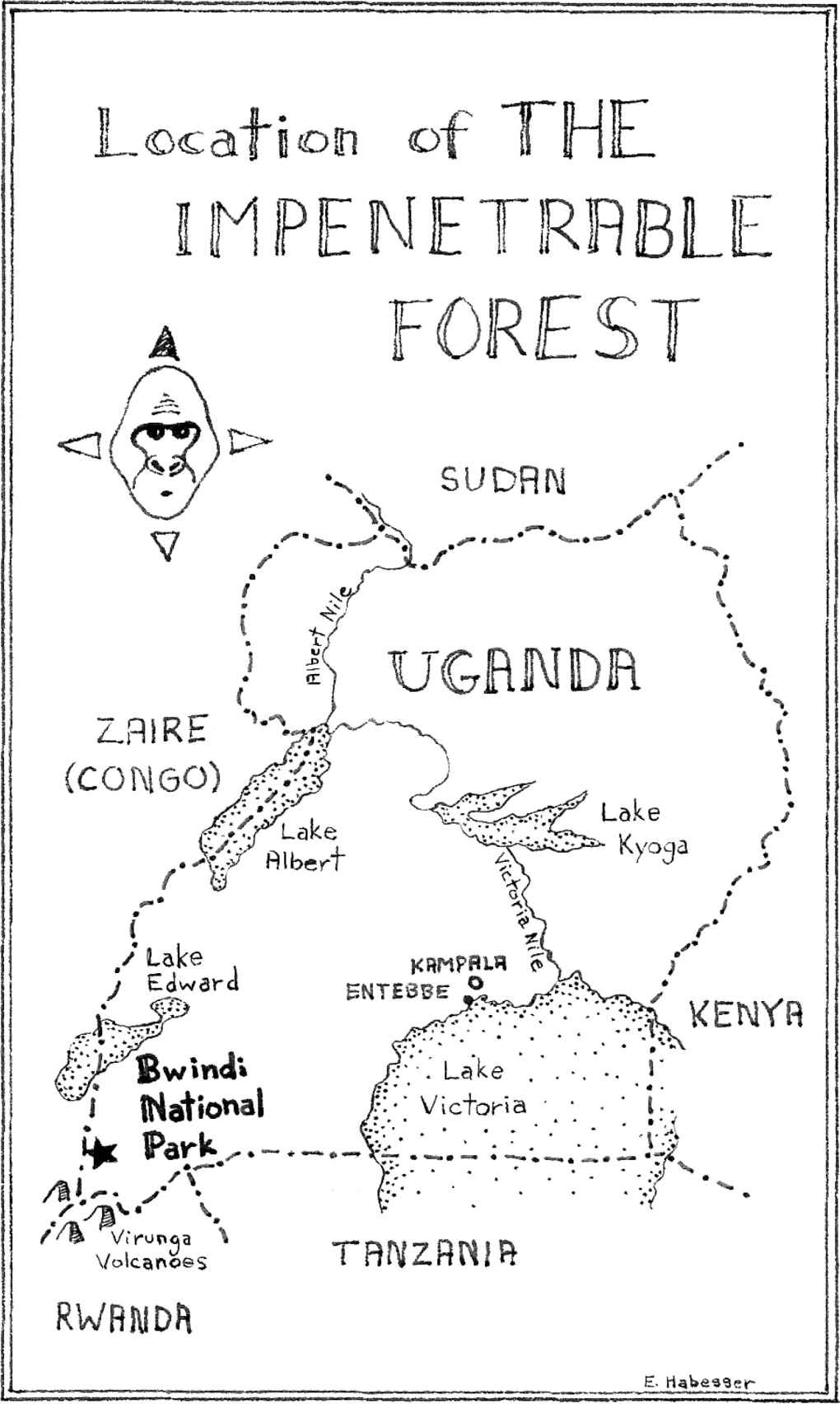
Contents
Acknowledgments
I am deeply indebted to the government and people of Uganda, and to the U.S. Peace Corps for providing me with the platform for this experience. I would also like to thank my long-suffering family and friends for putting up with meboth while I was away and while I was writing this book.
I think the author of any personal narrative owes everything to the people and places that make up his story. While I can never thank every person (or gorilla), let me acknowledge the friendship and support of these key characters: Liz Macfie, Kelleni Archabald, John Dubois, Rob Rothe, Dave Snedecker, Kathleen Henderson, Ted Hazard, Eunice Kang, Ed, Steve, Monica, Erwin, Alice, Jenny, Erin, Scott, Kelly, J, Rose Ssebatindira, the Ntale family, Commander JJ, Ignatius Achoka, Blasio Bbyekwaso, Phenny Gongo, Hope Nsiime, Tibesigwa Gongo, Enos Komunda, Betunga William, Alfred Twinomujuni, Medad Tumugabirwe, Caleb Tusiime, Levi Rwahamuhanda, Ephraim Akampurira, Agaba Philman, Abel Muhwezi, Magezi Richard, Stephen Mugisha, Prunari Rukundema, Charles Kyomukama, James Tibamanya, Mishana James, Yosamu Baleberaho, George Gachero, Benjamin Bayende, Gaston Kanyamanza, Benon, Daudi, Christopher, Stanley, Bafaki, Dominico, Eliphaz, and all the good folks from Bizenga to Kanyashande.
Richard Nelson provided valuable editorial comments on the manuscript, and Im also grateful to Gavin Caruthers and Eileen Bertelli for their enthusiasm and support. Betunga William provided essential help and companionship on recent travels to Uganda, and special thanks go out to Laura Blake Peterson and Steve Kasdin at Curtis Brown for arranging this edition. Finally, I am ever grateful to my wife, Eliza, and to my son, Noah, for everything.
Prologue
I speak of Africa and golden joys.
William Shakespeare
from Henry IV, Part II, ca. 1597
From my back window the forest rose in a wall of green, every possible shade, as if the whole spectrum were made from one color. Pale branches and tree trunks tangled through the foliage in an incomprehensible lattice, like veins of wood in a vast emerald sea. The stillness seemed ancient, a heavy, tropical pall broken only by the water-drop cries of a coucal or the soft chatter of waxbills. At dusk, the heat and birdsong gave way to cricket rasp, a deafening metallic backdrop to nights of mist and moonlight. I slept with the shutters ajar, half alert, listening for another kind of sound, haunting and unmistakable: the staccato chest beats and deep coughing barks of a mountain gorilla family, my closest rain forest neighbors and the subject of my work in Africa.
I joined the Peace Corps in the summer of 1993, committed to the idea of two years abroad with only the vaguest of job descriptions: Natural resource management in Uganda. Id turned down a similar post in the Gambia after a trip to the library yielded only four articles about that tiny riverbank countryall from medical journals about malaria. The literature on Uganda seemed comparatively vast, and while many stories focused on the despotic reign of Idi Amin, they also mentioned the Mountains of the Moon, the Great Rift Valley, and Lake Victoria, the source of the Nile, romantic features of a landscape that Winston Churchill once dubbed the pearl of Africa. The nature of my assignment, however, remained a mystery until I reached the country and sat for my last preservice interview. While the other volunteers answered questions about tree planting, teaching, and agricultural skills, my interrogation had a different focus:
Next pageFont size:
Interval:
Bookmark:
Similar books «The Impenetrable Forest»
Look at similar books to The Impenetrable Forest. We have selected literature similar in name and meaning in the hope of providing readers with more options to find new, interesting, not yet read works.
Discussion, reviews of the book The Impenetrable Forest and just readers' own opinions. Leave your comments, write what you think about the work, its meaning or the main characters. Specify what exactly you liked and what you didn't like, and why you think so.

